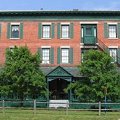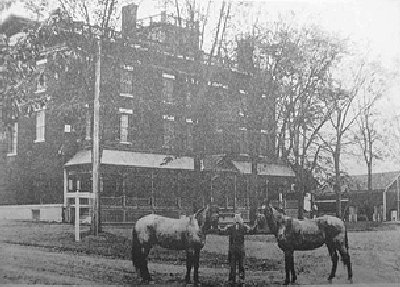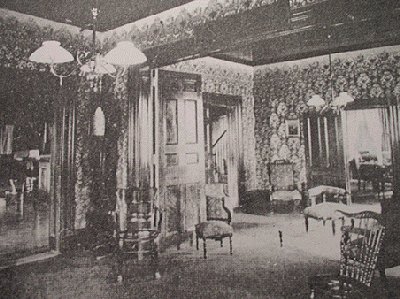- By Louise Bement
- Around Town
 Print
Print  From an old scrapbook
From an old scrapbook
Most Ithacans would not prick up their ears at the mention of "Rogue's Harbor", but there are still some who do not know much of the existence of this quaint little spot in the town of Lansing, eight miles from this city. With a history dating back almost 80 years, Rogue's Harbor stands out as the center of many interesting events which concern some who are now living, and have to do with some who are not.
The especial center of interest, the hotel, a quaint, but now modernized structure of colonial architecture, is situated at the Harbor.
Built in the year of 1830 by General D.D. Minier, of Lansing, the tavern sprang into instant favor, which has not diminished to this day.
General Minier was very well liked by neighbors and townsfolk in general. Being possessed of a fairly good voice, he led the choir in the Asbury Church for many years. Being a man of such good standing and commanding the respect that he did, it can be easily seen that he was a man of prominence in those early days. His father, Abram, was the owner of a large tract of land in the section and the son decided to erect a hotel on the property. So he secured the services of Lemuel Kelsey of Dryden, who with the aid of Nelson Morgan, began the building of the tavern. (I have corrected some errors in this paragraph. Newspapers in 1910 got things wrong, just as they do today. Louise Bement.)

Rogues Harbor Inn in the 1920s
General Minier's object in building the hotel was to construct a rooming part, and also a portion for a store. After the hotel was built, the owner reviewed the work with much satisfaction. The building was decidedly colonial, having wooden pillars in front and balconies running across each story on the west and north sides. There were three stories besides the attic. It made three balconies and made a very pleasing view. The exterior construction was of red brick.
The interior of the building was constructed with the greatest care and precision. Nelson Morgan, who was that time but an apprentice carpenter, constructed the famous winding stairway which was then considered a unique piece of workmanship. The stairway extends almost to the top of the building. It was also considered a great honor in those days to have a stairway of this kind in any house. Mr. Morgan was always very proud of this part of his work.
The first floor of the tavern was constructed as a bar and grill room. The second floor was given up to sleeping rooms, and the third floor was the ballroom. Above this was the attic. A portion on the north side, General Minier used for his general store.
When the workmen were putting the finishing touches on the structure, a carpenter by the name of William Egbert, who was about 40 years of age, fell from a platform in the gable to the ground, a distance of about 50 feet. Mr. Egbert was picked up, much jarred, but no bones were broken, and he was practically unhurt. This was considered one of the very peculiar incidents of those days. The accident happened upon a Fourth of July.
(The newspaper article says the hotel was finished in 1830, but Isabelle Parish's book, "It Happened in Lansing", published in 1964, reports that the date was 1842.) The place became known as the Central Exchange Hotel. Seven years after the completion General Minier died. Although it is not authentic, it is generally understood that the name of the family who moved into the tavern was Mallory, the man's name being Samuel Mallory. The Mallorys conducted the hotel for a score of years. Then Mr. Mallory sold the place to a man named Ketchum who ran the tavern on the usual high standard. Many persons stayed at the hotel, it being, at the time of its erection, on the direct stage route from Ithaca to Auburn.
Mr. Ketchum became the fixed Boniface of the hostelry, and many popular social functions were given in the hotel. Directly across from the inn was an old building which was unused. One day a man stood on the top of the building and, throwing a whiskey bottle against the hotel, christened the surroundings as Rogue's harbor, which name is used to this day. Some persons, however, have the erroneous idea that the name was applied to the little hamlet because of persons of a roguish nature who infested the neighborhood. This idea is said to be very wrong, as the neighborhood was one of the best in the section, and the people were all very highly respected.
During the reign of Mr. Ketchum at the hotel, an important social function was given, which is remembered by some Ithacans to this day. (This can not be correct because Isabelle Parish relates that General died in 1849 and so the following leap year party must have been when the hotel was under the ownership if Minier.)

The downstairs parlors are now a restaurant and bar
In May 1848, a committee consisting of Anson Knettles of South Lansing, Jonathan Norton and James Boice, of the same place, made arrangements for a leap year party to be given by some young ladies in the hotel. Accordingly invitations were sent to young men in Ithaca, Groton, Dryden, Enfield, and other sections, and many drove out to Rogue's Harbor and attended the dance and reception, which was a grand function. All the expenses were paid by the young ladies who had spared no efforts to make the affair a success. The ballroom was very beautifully decorated with ferns and evergreens, and presented a pretty effect. Sidney M. Morrison, of Lansing, had married Miss Susan Tichenor on that day, and they attended the reception and dance at the hotel. Mr. Morrison was a brother of J.T. Morrison, of this city, who also attended, it being the first year of his residence in Ithaca. An old time orchestra furnished the music for the old time dances. There were quadrilles, and Moneymusk, and the Spanish Dance, the latter being very popular at that time. The guests danced until an early hour and then all drove to their homes, after attending the most notable merrymaking ever given in Lansing.
Ketchum sold out to George Blythe, of Ithaca, who repaired the hotel, and ran it in first class manner. Some very fine dances were given in the ballroom which were attended by the best people in the surrounding communities.
Although one might think that because of the earliness of those times, the hotel was then backward in some respects, it was not. The proprietor endeavored to make the hostelry as modern as possible.
Mr. Blythe sold the place to Harry Miller, who moved into the place with his son, Will Miller, in 1860. After the elder Miller's death his son made several important improvements around the place, one of which was to put in a gas plant in 1889. Other repairs which were needed were made by the new proprietor. Will Miller conducted the hotel for some years, and in 1902 sold out to J.V. McIntyre, who came to South Lansing from Arrowhead Inn, Fourth Lake, Adirondacks.
In January, 1904, prominent men of Ithaca, conceived the idea of organizing the Rogue's Harbor Country Club. The object was to get up a club for social and athletic purposes. The property was accordingly leased from Mr. McIntrye and the club was started with him in charge.
Immediately north of the hamlet was located a race course, about one half mile in length. It was beautifully laid out and was destined to become the scene of many interesting races. In the year of 1840 the sport took on a good start. Dr. Coryell of Ithaca, who was a keen devotee of the sport, would frequently bring up some fast horses, and close races would be run off. One of his competitors was Samuel Ives, and another was a man by the name of Beardsley. Beardsley was in possession of a noted race horse called the "Beardsley Mare". This horse was very speedy, and was invariably successful against the horses of Coryell and Ives. The racing was continued until about 1859. The course was a straight one. Many of the old residents of that section may remember the races which were so closely contested.
So you can readily see how this old tavern, built many years ago, is possessed of an interesting history, and some history, too, which can not be remembered by many of those of this day.
Another old scrapbook has an article entitled "Talk of the Town of Lansing" by Mrs. Francis M. Isenberg. She relates that when Harry Miller was the owner in 1860 he had the balconies and pillars removed and replaced by a wide porch across the front. He also had planted a screen of Elm trees along the drive, and renamed the place Elm Grove Hotel.
Historical photographs courtesy of Eileen Stout
----
v4i45



